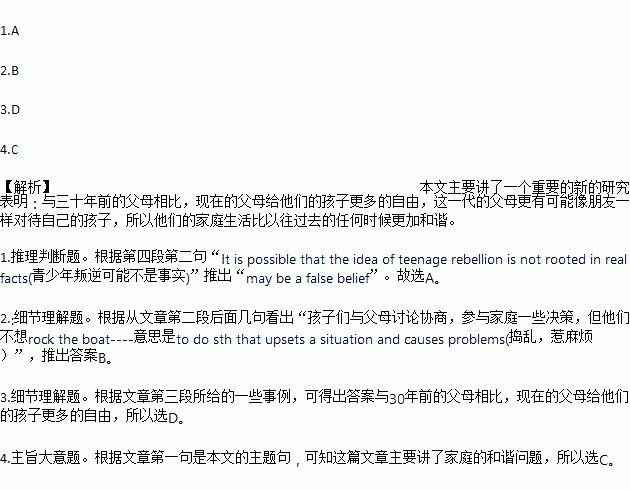题目内容
The evidence for harmony may not be obvious in some families. But it seems that four out of five young people now get on well with their parents, which is the opposite of the popularly-held image of unhappy teenagers locked in their room after endless family quarrels.
An important new study into teenage attitudes surprisingly shows that their family life is more harmonious than it had ever been in the past. “We were surprised by just how positive today’s young people seem to be about their families,” said one member of the research team. “They’re expected to be rebellious(叛逆的) and selfish but actually they have other things on their minds: they want a car and material goods, and they worry about whether school is serving them well. There’s more negotiation(商议) and discussion between parents and children, and children expect to take part in the family decision-making process. They don’t want to rock the boat.”
So it seems that this generation of parents is much more likely than parents of 30 years ago to treat their children as friends. “My parents are happy to discuss things with me and willing to listen to me,” says 17-year-old Daniel Lazall. “I always tell them when I’m going out clubbing. As long as they know what I’m doing, they’re fine with me.” Susan Crome, who is now 21, agrees. “Looking back on the last 10 years, there was a lot of what you could call negotiation. For example, as long as I’d done all my homework, I could go out on a Saturday night. But I think my grandparents were a lot stricter with my parents than that.”
Maybe this positive view of family life should not be unexpected. It is possible that the idea of teenage rebellion(反抗) is not rooted in real facts. A researcher comments, “Our surprise that teenagers say they get along well with their parents comes because of a brief period in our social history when teenagers were regarded as different beings. But that idea of rebelling and breaking away from their parents really only happened during that one time in the 1960s when everyone rebelled. The normal situation throughout history has been a smooth change from helping out with the family business to taking it over. ”
1.According to the author, teenage rebellion______
A. may be a false belief B. is common nowadays
C. existed only in the 1960s D. resulted from changes in families.
2.The study shows that teenagers don’t want to __________.
A. share family responsibility
B. cause trouble in their families
C. go boating with their family
D. make family decisions
3.Compared with parents of 30 years ago, today’s parents ____________.
A. go to clubs more often with their children
B. are much stricter with their children
C. care less about their children’s life
D. give their children more freedom
4.What is the passage mainly about?
A. Negotiation in family. B. Education in family.
C. Harmony in family. D. Teenage trouble in family.
 世纪百通主体课堂小学课时同步达标系列答案
世纪百通主体课堂小学课时同步达标系列答案 世纪百通优练测系列答案
世纪百通优练测系列答案 百分学生作业本题练王系列答案
百分学生作业本题练王系列答案
